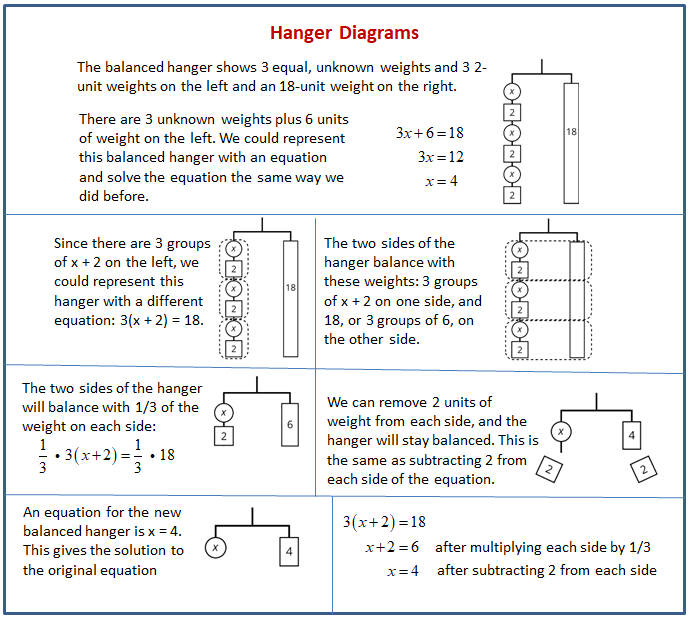Illustrative Mathematics Grade 7, Unit 6, Lesson 8: Reasoning about Solving Equations (Part 2)
Learning Targets:
- I can explain how a balanced hanger and an equation represent the same situation.
- I can explain why some balanced hangers can be described by two different equations, one with parentheses and one without.
- I can find an unknown weight on a hanger diagram and solve an equation that represents the diagram.
- I can write an equation that describes the weights on a balanced hanger.
Related Pages
Illustrative Math
Grade 7
Lesson 8: Reasoning about Solving Equations (Part 2)
Let’s use hangers to understand two different ways of solving equations with parentheses.
Illustrative Math Unit 7.6, Lesson 8 (printable worksheets)
Lesson 8 Summary
The following diagram explains why some balanced hangers can be described by two different equations, one with parentheses and one without.

Lesson 8.1 Equivalent to 2(x + 3)
Select all the expressions equivalent to 2(x + 3)
- 2 · (x + 3)
- (x + 3)2
- 2 · x + 2 · 3
- 2 · x + 3
- (2 · x) + 3
- (2 + x)3
Lesson 8.2 Either Or
- Explain why either of these equations could represent this hanger:
- Find the weight of one circle. Be prepared to explain your reasoning.
Lesson 8.3 Use Hangers to Understand Equation Solving, Again
Here are some balanced hangers. Each piece is labeled with its weight.
- For each diagram: Assign one of these equations to each hanger:
- Explain how to figure out the weight of a piece labeled with a letter by reasoning about the diagram.
- Explain how to figure out the weight of a piece labeled with a letter by reasoning about the equation.
Lesson 8 Practice Problems
- Here is a hanger:
a. Write an equation to represent the hanger.
b. Solve the equation by reasoning about the equation or the hanger. Explain your reasoning. - Explain how each part of the equation 9 = 3(x + 2) is represented in the hanger.
- Select the word from the following list that best describes each situation.
A. You deposit money in a savings account, and every year the amount of money in the account increases by 2.5%.
B. For every car sold, a car salesman is paid 6% of the car’s price.
C. Someone who eats at a restaurant pays an extra 20% of the food price. This extra money is kept by the person who served the food.
D. An antique furniture store pays $200 for a chair, adds 50% of that amount, and sells the chair for $300.
E. The normal price of a mattress is $600, but it is on sale for 10% off.
F. For any item you purchase in Texas, you pay an additional 6.25% of the item’s price to the state government. - Clare drew this diagram to match the equation 2x + 16 = 50, but she got the wrong solution as a result of using this diagram.
a. What value for x can be found using the diagram?
b. Show how to fix Clare’s diagram to correctly match the equation.
c. Use the new diagram to find a correct value for x.
d. Explain the mistake Clare made when she drew her diagram.
The Open Up Resources math curriculum is free to download from the Open Up Resources website and is also available from Illustrative Mathematics.
Try the free Mathway calculator and
problem solver below to practice various math topics. Try the given examples, or type in your own
problem and check your answer with the step-by-step explanations.

We welcome your feedback, comments and questions about this site or page. Please submit your feedback or enquiries via our Feedback page.